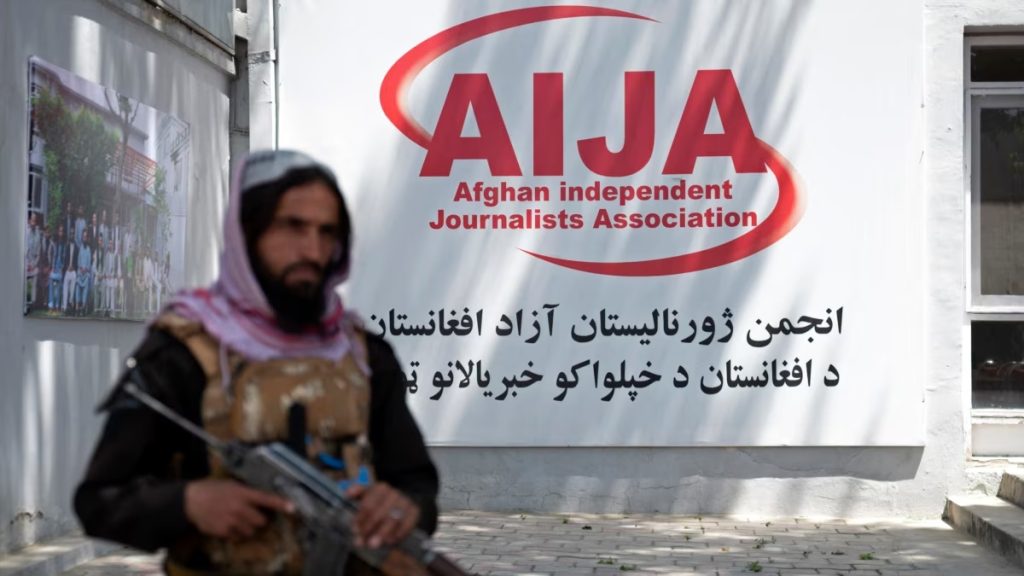In a move that has drawn widespread criticism, the Taliban’s Ministry of Information and Culture recently issued a directive requiring all media outlets in Afghanistan to align their operations with Islamic principles and the group’s policies. Media outlets failing to comply face closure.
This decision represents a significant escalation in the Taliban’s efforts to control information and suppress dissenting voices, raising concerns over press freedom and human rights in the war-torn country.
The directive has been widely condemned by international organizations and journalists. Prominent journalist and press freedom advocate Maria Ressa highlighted the dangers of such measures, stating, “A free press is the cornerstone of a functioning democracy.
Without it, accountability and transparency crumble, leaving space for authoritarian control.” The Taliban’s actions are not just an attack on journalism but also a broader attempt to silence criticism and dissent in Afghanistan.
Since the Taliban’s return to power in August 2021, Afghan media has faced increasing restrictions. Many outlets have been forced to shut down due to financial pressures, censorship, or threats to journalists. According to the Committee to Protect Journalists (CPJ), over 40% of Afghan media outlets have ceased operations since the Taliban’s takeover. This latest directive further erodes the space for independent journalism.
The imposition of such restrictions also undermines the progress made in Afghanistan’s media landscape over the past two decades. From 2001 to 2021, Afghanistan saw the growth of a vibrant media sector, with hundreds of radio stations, TV channels, and newspapers emerging across the country. These outlets provided a platform for diverse voices, including women journalists, who are now facing unprecedented challenges under Taliban rule.
One of the most concerning aspects of the Taliban’s media policies is their impact on women journalists. Many women have been forced out of their jobs, and those who remain face significant restrictions. The Taliban’s interpretation of Islamic principles often excludes women from public life, further silencing half of the population.
This suppression has drawn criticism from figures like Christiane Amanpour, who noted, “Silencing women’s voices in media is not just a loss for journalism but a loss for society. Women’s stories and perspectives are crucial for understanding and addressing societal challenges.”
The Taliban’s latest move has sparked international outrage. Organizations like Reporters Without Borders (RSF) and Amnesty International have called for urgent measures to protect Afghan journalists. RSF’s secretary-general, Christophe Deloire, stated, “Afghanistan’s media is on the brink of extinction. The international community must act now to ensure the survival of independent journalism in the country.”
Critics argue that the Taliban’s actions are part of a broader strategy to consolidate power and eliminate dissent. By controlling the media, the Taliban can shape the narrative and suppress information about human rights abuses, economic crises, and growing opposition to their rule. This control over information makes it even more difficult for Afghans and the international community to hold the regime accountable.
Despite these restrictions, many Afghans are turning to social media and alternative platforms to share information. Platforms like Twitter, Facebook, and encrypted messaging apps have become vital tools for journalists and activists. However, the Taliban has also sought to regulate digital spaces, often pressuring social media companies to comply with their demands or blocking access to certain platforms.
The international community can play a crucial role in supporting Afghan journalists by providing them with resources, training, and safe platforms to continue their work. Initiatives like global press coalitions and funding for independent Afghan media operating in exile are essential for preserving the flow of information.
The Taliban’s directive to control media operations under the guise of Islamic principles is a direct attack on press freedom and a violation of fundamental human rights. By silencing independent voices, the Taliban is attempting to tighten its grip on power and shield itself from scrutiny. The international community must respond with urgency to support Afghan journalists and uphold the principles of free expression. Without a free press, Afghanistan risks descending further into isolation, authoritarianism, and repression. As journalist Maria Ressa aptly stated, “The battle for truth is the battle for democracy.” The world cannot afford to let Afghanistan lose this battle.


